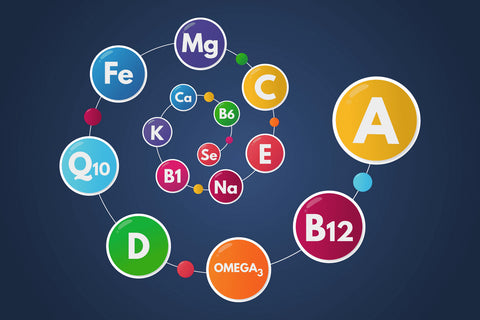Malnutrition is a serious issue that affects millions around the globe. Many people who suffer from it can appear healthy and may not notice any symptoms at all.
Malnutrition, or “nutritional deficiency can be caused by a lack of any of the essential nutrients that our body needs, including calories, protein, and fatty acids. However, the most common are nutritional deficiencies caused by the lack of vitamins and minerals.
Micronutrient deficit can be characterized by a lack of specific minerals, vitamins, and trace elements. The most widespread and most dangerous among them is the deficiency of Vitamin D, Magnesium, Iron, Vitamin B12, Zinc, Selenium, Iodine, Boron, Calcium, Vitamin E, and Omega-3.
There are various possible causes of nutritional deficiencies. Some of the most common include bad dietary habits, regular consumption of foods low in nutrients, poorly planned diet, and frequent use of stimulants. Also stress, loss of appetite, deficiency of digestive enzymes, and digestive disorders interfere with nutrient absorption.
Complications and Conditions Related to Malnutrition
Nutritional deficiencies increase the risk of a long list of diseases and disorders. They can cause many negative malnutrition symptoms and health complications as well. Here are a few of the most common malnutrition diseases that can be caused by a lack of one or more specific nutrients in the diet: Dysfunctional and weak immunity (Vitamin D, Zinc, Selenium, B12), Scurvy (Vitamin C), rickets (Vitamin D), megaloblastic anemia (Vitamin B12), iron-deficiency anemia, osteoporosis (Calcium, Vitamin D, Boron, Vitamin K2), hypothyroidism (Iodine), beriberi (Vitamin B1), and pellagra (Vitamin B3).
Signs of the Most Common Vitamin and Mineral Deficiencies
MAGNESIUM DEFICIENCY: Mood problems, depression, anxiety, muscle cramps and weakness, stomach cramps, sleep difficulties (despite feeling tired), spastic colon, menstrual cramps, morning sickness, cravings for sugar and salt, constipation, mental health conditions (1).
VITAMIN D DEFICIENCY: Weak bones, osteoporosis, compromised immunity, muscle weakness, frequent infections, high blood pressure, autoimmune conditions, high risk of developing cancer, mood problems, brain damage, diabetes, skin problems, infertility, and other medical conditions.
VITAMIN B12 DEFICIENCY: Anaemia, numbness and tingling in extremities, nerve damage, neurological pains, mental fog, fatigue, low white blood cell count, vision problems, complications during pregnancy, weak immunity, dementia, muscle weakness, sleep problems, mouth sores, depression and mood disturbances, etc. (2).
CALCIUM DEFICIENCY: Muscle cramps, muscle weakness and spasms, heart problems, weak and brittle nails, low energy, weak bones (prone to fractures) and teeth, bone and hip fractures, confusion, memory loss, depression, weak and brittle nails.

ZINC DEFICIENCY: Recurrent infections and allergies, impaired protein digestion, hair and skin problems, nail abnormalities, prostate issues, hormonal imbalance in men and women, low stamina and libido, poor focus and memory, changes in appetite, low mood, cravings for salty or sweet foods, infertility, wounds that take a long time to heal.
IODINE DEFICIENCY: Thyroid problems, lump (goitre) on the neck, fatigue and weakness, weight gain, dry skin, thinning of the hair, feeling cold, higher risk of ovarian and breast cancer, muscle and joint pain, mental impairment, learning and memory difficulties, slower heart rate, menstrual irregularities, and menstrual cycle problems (3).
IRON DEFICIENCY: Anaemia, tiredness, poor memory, restless leg syndrome, muscle weakness dizziness, hair loss, tongue issues, rapid heartbeat, depression, anxiety, fibromyalgia, inflammatory bowel disease, underactive thyroid (4).
VITAMIN E DEFICIENCY: Weak immunity, excessive blood clotting, vain weakness, heart problems, restless legs syndrome, weak immune system, fibrocystic breast disease, weak blood vessels, male infertility, vision problems, hormonal imbalance, menstrual pains, premenstrual syndrome (PMS), poor joint health, lack of energy, celiac disease.
OMEGA-3 FATTY ACIDS: Omega-3 fatty acid deficiency can result in symptoms like excess earwax build-up, premenstrual problems, difficulty concentrating, joint pain, depression, anxiety, dry, itchy skin, weak and dry hair, dry eyes, brittle nails, problems with falling asleep at night and waking in the morning, tiredness, attention problems, low mood, joint pain, frequent urination, etc (5).
How to address Nutritional Deficiencies?
INCLUDE SUPERFOODS, ANTIOXIDANTS, HERBS, AND PROBIOTICS
-
To boost energy, detoxification, and regeneration, take 1 tablespoon of Super Greens powder with a smoothie or fresh vegetable juice about 30 minutes before the first meal.
-
Take 3-5 tablets of Kelp every day with the first meal to ensure you provide your body with a sufficient amount of natural iodine.
-
Take one teaspoon of cold-pressed, organic Black Seed (Nigella sativa) oil twice daily with meals dur to its excellent antimicrobial and immune system boosting properties.
-
Make sure you avoid excessive consumption of proinflammatory omega-6 fatty acids (margarine, refined oils, etc.). Increase intake of healthy Omega-3 fatty acids in the form of good quality and free from heavy metals fish oils or plant-based sources of Omega-3 such as chia seeds, cold-pressed flax oil, or ground fresh flaxseed.
-
Don’t forget about good Probiotic formulas (UltraProbio, DailyProbio, etc.) with a meal to improve your digestive and gut health, immunity, and mood.
-
Ashwagandha will increase your ability to control stress and help to boost energy, stamina, and support hormonal balance.
-
Alpha Lipoic Acid (the best antioxidant with multiple health benefits): 250-500mg twice daily.
TAKE VITAMINS AND MINERALS IN THE FORM OF NUTRITIONAL SUPPLEMENTS
Plants usually grow on poor-quality soils of low mineral content. Consequently, even a well-rounded whole-food diet may not offer your body an adequate concentration of essential nutrients. Moreover, the prevalent consumption of processed and nutrient-depleted foods, the use of common stimulants, and daily exposure to emotional stress contribute to potential nutritional deficiencies, significantly elevating the risk of various health issues. Hence, it becomes crucial to complement your diet with the following nutritional supplements.
Consume one tablet of a quality Multivitamin-Mineral formula (such as Healthy Mega, Day-vit Active, or A-Z Multivit) with breakfast and another with lunch. Rotate between different multivitamins instead of consistently using the same one. For instance, you can alternate between Healthy Mega, Day-vit Active, and A-Z Multivit.
As multivitamins almost always lack sufficient amounts of Magnesium, Vitamin D, and B12, in addition to the multivitamin, take the following additional doses of these three crucial nutrients:
150-200mg of Magnesium (preferably free from additives pure Magnesium Citrate powder) twice daily, in the morning and evening.
5000 IU of Vitamin D3 daily after breakfast. Initially, for 1-3 months, high daily doses of 20000 IU are required followed by the maintenance dose of 5000 IU.
1000 mcg to 2000 mcg of Vitamin B12 in the form of sublingual Methylcobalamin every day, after breakfast by placing it under the tongue.

IMPLEMENT NUTRITIONAL AND LIFESTYLE GUIDELINES
-
Eat more fresh, raw, and steamed vegetables, particularly leafy greens, carrots, beets, and cruciferous vegetables. Aim for at least 50% of your diet to comprise raw and unprocessed plant foods. The highest concentration of nutrients, especially minerals, is found in fresh raw vegetable juices and sprouts.
-
Incorporate well-cooked whole grains into your diet, especially barley, millet, oats, buckwheat, quinoa, and amaranth. Replace wheat with wholemeal spelt.
-
Consume soaked overnight and well-cooked pulses such as beans, lentils, and chickpeas as your primary source of protein.
-
Consume a handful of raw, unsalted, and soaked overnight nuts and seeds daily, such as almonds, pumpkin seeds, walnuts, Brazil nuts, sunflower seeds, and ground sesame seeds.
-
Include 1 tablespoon of ground flaxseed or soaked chia seeds with each breakfast. Both are the best sources of plant-based Omega-3 fatty acids.
-
Substitute cow's milk and dairy with plant-based alternatives like organic Tofu, unsweetened coconut milk, oat milk, almond milk, and organic, non-GMO soy milk.
-
Avoid sweetened and flavored yogurts, especially those based on cow's milk, due to their fat, animal protein, and high sugar content. Opt for unsweetened plant-based alternatives like coconut yogurt or organic soy yogurt, mixed with sweet fruits, chia seeds, ground flaxseed, nuts, oat bran, or psyllium husk powder. If desired, sweeten with raw honey, stevia, erythritol, or xylitol.
-
Use sea salt or pink (Himalayan) salt instead of refined salt.
-
Stay hydrated by drinking approximately 2-3 glasses of water (distilled or properly filtered) three times a day, 30 to 60 minutes before each meal or about 2 hours after meals. Transparent urine is an indicator of proper hydration. Avoid unfiltered tap water and water stored in plastic containers, opting instead for distilled water, which is free from contaminants and inorganic calcium. Add a pinch of sea salt or Himalayan salt before consuming distilled water.
Related Articles
Sources
- https://draxe.com/nutrition/9-signs-magnesium-deficiency/
- https://draxe.com/nutrition/vitamin-b12-deficiency-symptoms/
- https://draxe.com/nutrition/iodine-deficiency/
- https://draxe.com/nutrition/iron-deficiency/
- https://www.vivolife.co.uk/blogs/news/10-signs-of-an-omega-3-deficiency
Image Attributions:
Image by Freepik, Image by pch.vector on Freepik, Image by macrovector on Freepik
Any information or product suggested on this website is not intended to diagnose, treat, cure or prevent any medical condition. Never disregard medical advice or delay in seeking it because of something you have read on this website. Consult your primary healthcare physician before using any supplements or making any changes to your regime.






